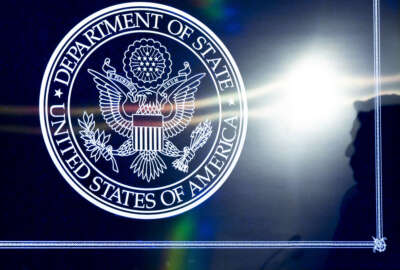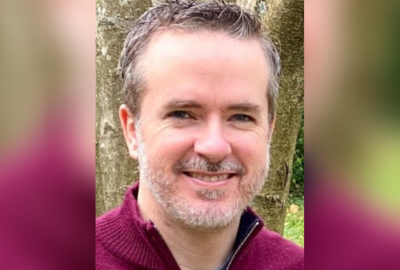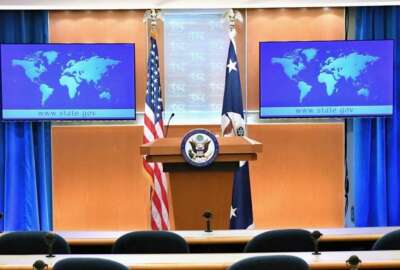How the State Department uses data to improve work with the U.N.
The Federal Drive has been bringing its audience stories of State Department employees who received this year's Data for Diplomacy Awards. One awardee was honored...
The Federal Drive has been bringing its audience stories of State Department employees who received this year’s Data for Diplomacy Awards. One awardee was honored for changing the approach of the State Department’s delegation to the United Nations in Geneva — specifically the Human Rights Council. Federal Drive with Tom Temin spoke with Jesse Lynch, the Human Rights Officer for U.S. Mission to the U.N. Delegation to the Human Rights Council.
Interview Transcript:
Tom Temin Well, tell us exactly what this delegation does, how it relates to the Human Rights Council. And it sounds like a complicated apparatus here.
Jesse Lynch So I’m here in Geneva. I work for the U.S. mission in the United Nations and other international organizations in Geneva, which really serves a crucial role in advancing american values and interests on the international stage. The U.S. Mission, its goal is really to promote human rights address more broadly, global health initiatives to respond to humanitarian crises and foster international cooperation, among many other things. The mission has a dedicated team of diplomats, subject matter experts and support staff, really with the top of the line expertise on all of these issues, all working together to uphold the commitments of multilateral diplomacy. Now, I work on the delegation of the Human Rights Council, and our specific roles and mission is to really shine a spotlight on countries, the worst human rights records, but also to help improve human rights situations around the world. So we support those fighting injustice and tyranny. We champion the values of freedom and equality. And it’s really through close collaboration with other partners and other diplomatic missions and civil society and non-governmental organizations that we really are able to advocate for human rights principles and defend the rights of all throughout the world.
Tom Temin And how does this work day to day? I mean, do you go from the State Department location in Geneva to a place that is operated by the U.N. and sit down and argue with people from Cuba? Or what happens day-to-day there?
Jesse Lynch A big part of our job is being outside of our office. We are meeting on a day-to-day basis with other delegations. So other countries, representatives here in Geneva, we’re meeting with civil society hearing their concerns. A part of that is sitting down in the halls of the United Nations and negotiating on resolutions, on texts that ultimately we hope will improve the situation of human rights for people around the world. And a part of that is having conversations not only with countries that are closely like minded with us, but countries that we don’t see eye to eye on a lot of issues. But doing that here in the halls of the United Nations, a lot of the barriers in the walls are taken down and they allow for that type of direct communication and dialog to help us find consensus and ways forward on some issues that are quite difficult.
Tom Temin Let’s get to the data aspects of this, because it sounds like a lot of human relations, a lot of work with making sure that what you say aligns with administration or State Department policy. And that’s political type of work or human relations type of work. How does data come into all of this? And tell us more about the data project that you did.
Jesse Lynch Absolutely. You might be wondering what is data for that? There’s so much data and information and the history of the United Nations and how countries operate in this space. And one of the things that we were curious about, a couple of years ago, is how can we look to the history of how countries vote? How can we look at the history of how countries approach certain issues and take that in and analyze it in a way to help us predict how countries will vote on a resolution that’s going to come up next year on issue related to freedom of expression, for example. How do we expect a country will form partnerships and coalitions that may try to counter our initiatives and things that we’re trying to see take place in the Human Rights Council?
Jesse Lynch We looked at what was the best way to kind of pull this together. So we ended up looking at U.N. databases, databases from [Non Governmental Organizations (NGOs)] that are online. And I identified a team of virtual interns that the State Department allows us to pull from, and some of those being students in the field of data science. And we were able to call nearly 6.3 million data points on how countries operate on nearly every human rights issue, every single country in the world. And we put it into a database and then really started to dig in and do some fund analysis to see if we can come up some predictions. And what that allowed us to do is once we got all that data inside of a dataset, is to develop a platform to help give us live and changing analysis that allows us to predict voting patterns and behaviors of states, ultimately allow us to better form lobbying strategies when we’re trying to pursue a certain resolution on that issue and to build partners and coalitions to help us achieve what we’re looking to achieve.
Tom Temin We’re speaking with Jesse Lynch. He’s human rights officer for the U.S. Mission to the U.N. Delegation, to the Human Rights Council. So that’s pretty interesting because the implication is that much as you think you might know a nation or its delegation or its point of view, it’s a little more subtle than that, and you can’t know for sure without some analytical tools how it might vote. That is to say you can’t assume anything about what another nation is going to do or say or think about a particular topic.
Jesse Lynch Absolutely. And it’s not just our delegation that’s interested in this. Even when we’re with or likeminded with our partners, we’re always questioning ourselves. And what would this country do if we were to present a resolution or a discussion on a topic that could be perceived as controversial? And no one seemed to have the data around to be able to back that up. So we were quite proud to pull together a very powerful tool that allows us to harness the data in a way to make data informed decisions.
Tom Temin Sure. And there are things that are relatively non-controversial, even in the U.N. Delegation to the Human Rights Council, for example, the situation in Sudan. Not too many people disagree that that’s not good. But then there are a lot of issues where, like, say, the Commission on inquiry for Israel that goes on and on and on and on, there’s a lot of controversy over that one and its justification and so forth. So you’ve got a range of things from, yeah, we all agree on this pretty much to, wait a minute. We’re butting heads on this all over the place. Fair to say?
Jesse Lynch Yeah. The tool allows us to make decisions based on the data. So we are always asking ourselves, what does the data say? And certainly that may not always align with the policy options that are on the table, but it’s one additional and new type of input that our policymakers have when they’re making those key decisions that could have broad cross-cutting implications.
Tom Temin Well, would the data cause a change in the vote on a particular issue, or would it simply maybe inform the way the United States talks about it or frames it to other nations.
Jesse Lynch The data wouldn’t necessarily change the vote, but like the latter point, yes, it could change the way that we approach talking about issues with partners. An example, last summer there was a resolution that dealt with discrimination against women and girls, and there were some countries who were seeking to roll back protections against women and girls. And the data allowed us to really predict which countries in that against column would likely be the biggest opponents. And we were able to then roll out targeting lobbying strategies to try to lessen the impact of that counter-offensive.
Tom Temin Interesting. And just to get back to the process here, you wanted to pull all of this data together and you used interns that were stateside? There’s a lot of interns at the State Department and under different channels.
Jesse Lynch Absolutely. This is a special program within the federal government, the Virtual Student Federal Service Internship Program. So they are college students, American college students from around the country that commit to working 10 to 15 hours a week. And I had a team of six interns. Half of them were focused on political science and half on data science. And so I brought them together to help us come up with innovative ways to interpret the data and to pull the data together in a way that was understandable.
Tom Temin And what sort of program or application or algorithm did all of this analysis for you?
Jesse Lynch The State Department. So this is an online platform that the State Department allows us to use. I will say that the Center for Data Analytics in Washington and the promotion that they have for fostering innovation was really a driving force behind this, and some of the tools that they flagged for us. They’re tools that are easily accessible to the Microsoft Office platform. So nothing not creating a new system, but using the systems that we have in order to allow us to accomplish this.
Tom Temin And just tell us about yourself a little bit, how you came to the job you have now a human rights officer. I don’t know where that ranks in the hierarchy of State Department from diplomat to whatever. Where does that all fall? And how did you get to where you are?
Jesse Lynch So I am a Foreign Service officer, so a diplomat based here in Geneva. I’ve been up for a couple of years. My previous assignments included Tel Aviv, Israel. I’ve served in Cambodia and Phnom Penh covering internal political issues and also sort human rights issues. I’ve served in Kuwait doing consular work. And prior to the Foreign Service, I was a civil service in the State Department focusing on a number of issues, mainly the Middle East. My educational background from university, focusing almost right after 9/11, was on Middle East studies and studying languages and studying Arabic. And I received a couple of government fellowships that took me to the Middle East where I master the Arabic language. And it has opened up many opportunities throughout the region to support our efforts.
Copyright © 2025 Federal News Network. All rights reserved. This website is not intended for users located within the European Economic Area.
Tom Temin is host of the Federal Drive and has been providing insight on federal technology and management issues for more than 30 years.
Follow @tteminWFED






